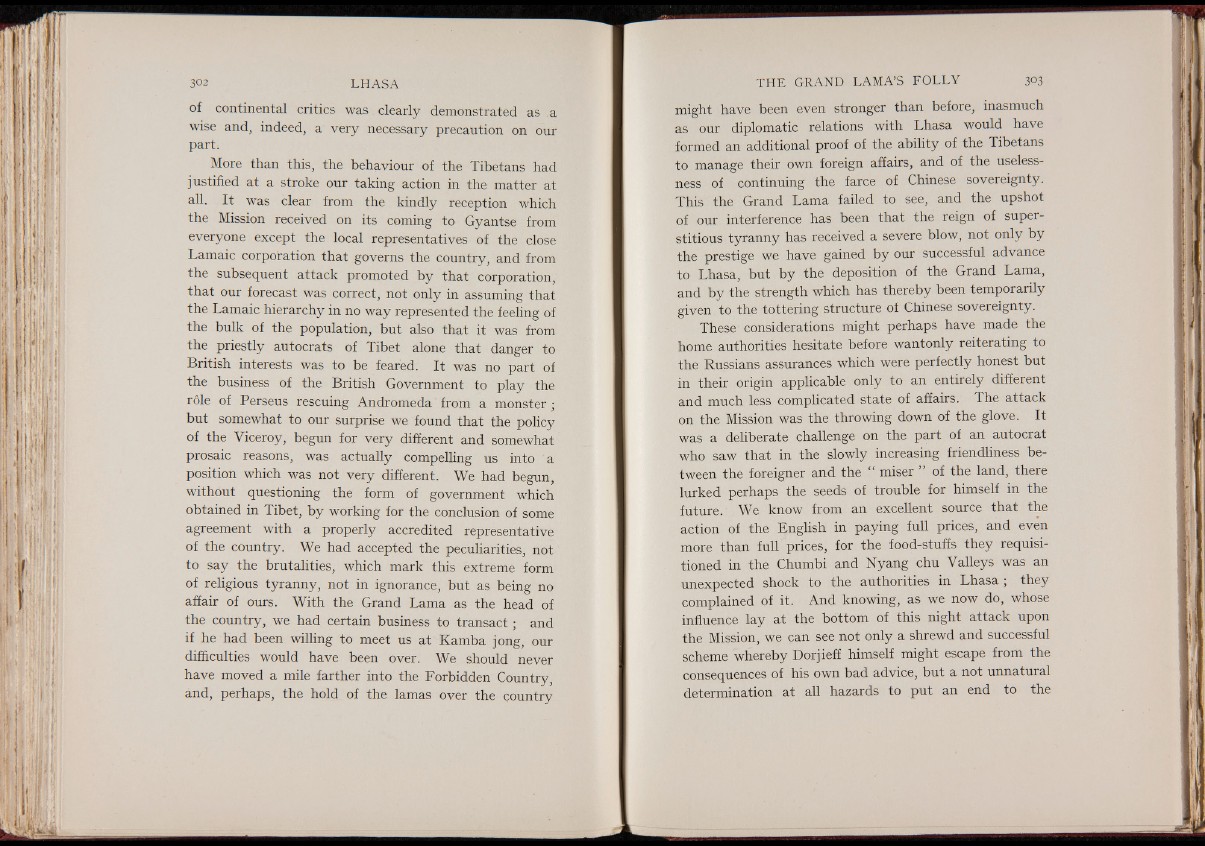
of continental critics was clearly demonstrated as .a
wise and, indeed, a very necessary precaution on our
part.
More than this, the behaviour of the Tibetans had
justified at a stroke our taking action in the matter at
all. It was clear from the kindly reception which
the Mission received on its coming to Gyantse from
everyone except the local representatives of the close
Lamaic corporation that governs the country, and from
the subsequent attack promoted by that corporation,
that our forecast was correct, not only in assuming that
the Lamaic hierarchy in no way represented the feeling of
the bulk of the population, but also that it was from
the priestly autocrats of Tibet alone that danger to
British interests was to be feared. It was no part of
the business of the British Government to play the
role of Perseus rescuing Andromeda from a monster ;
but somewhat to our surprise we found that the policy
of the Viceroy, begun for very different and somewhat
prosaic reasons, was actually compelling us into a
position which was not very different. We had begun,
without questioning the form of government which
obtained in Tibet, by working for the conclusion of some
agreement with a properly accredited representative
of the country. We had accepted the peculiarities, not
to say the brutalities, which mark this extreme form
of religious tyranny, not in ignorance, but as being no
affair of ours. With the Grand Lama as the head of
the country, we had certain business to transact; and
if he had been willing to meet us at Kamba jong, our
difficulties would have been over. We should never
have moved a mile farther into the Forbidden Country,
and, perhaps, the hold of the lamas over the country
might have been even stronger than before, inasmuch
as our diplomatic relations with Lhasa would have
formed an additional proof of the ability of the Tibetans
to manage their own foreign affairs, and of the uselessness
of continuing the farce of Chinese sovereignty.
This the Grand Lama failed to see, and the upshot
of our interference has been that the reign of superstitious
tyranny has received a severe blow, not only by
the prestige we have gained by our successful advance
to Lhasa, but by the deposition of the Grand Lama,
and by the strength which has thereby been temporarily
given to the tottering structure of Chinese sovereignty.
These considerations might perhaps have made the
home authorities hesitate before wantonly reiterating to
the Russians assurances which were perfectly honest but
in their origin applicable only to an entirely different
and much less complicated state of affairs. The attack
on the Mission was the throwing down of the glove. It
was a deliberate challenge on the part of an autocrat
who saw that in the slowly increasing friendliness between
the foreigner and the “ miser ” of the land, there
lurked perhaps the seeds of trouble for himself in the
future. We know from an excellent source that the
action of the English in paying full prices, and even
more than full prices, for the food-stuffs they requisitioned
in the Chumbi and Nyang chu Valleys was an
unexpected shock to the authorities in Lhasa; they
complained of it. And knowing, as we now do, whose
influence lay at the bottom of this night attack upon
the Mission, we can see not only a shrewd and successful
scheme whereby Dorjieff himself might escape from the
consequences of his own bad advice, but a not unnatural
determination at all hazards to put an end to the